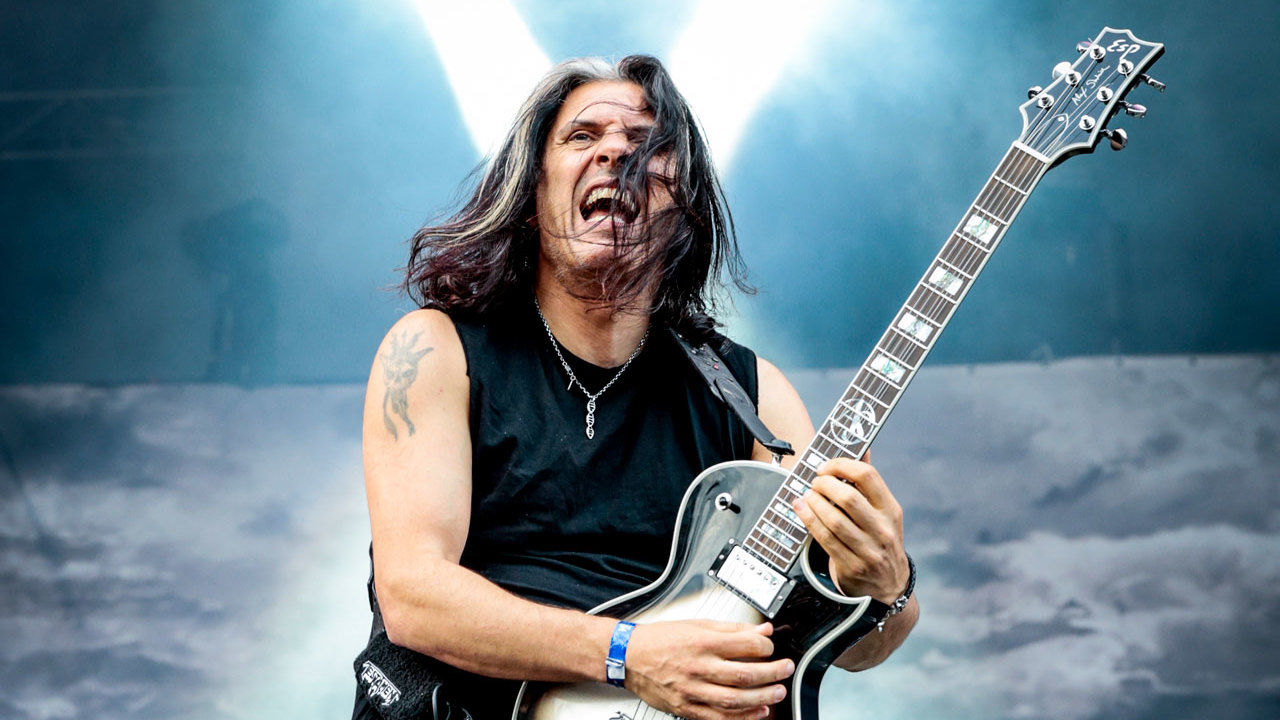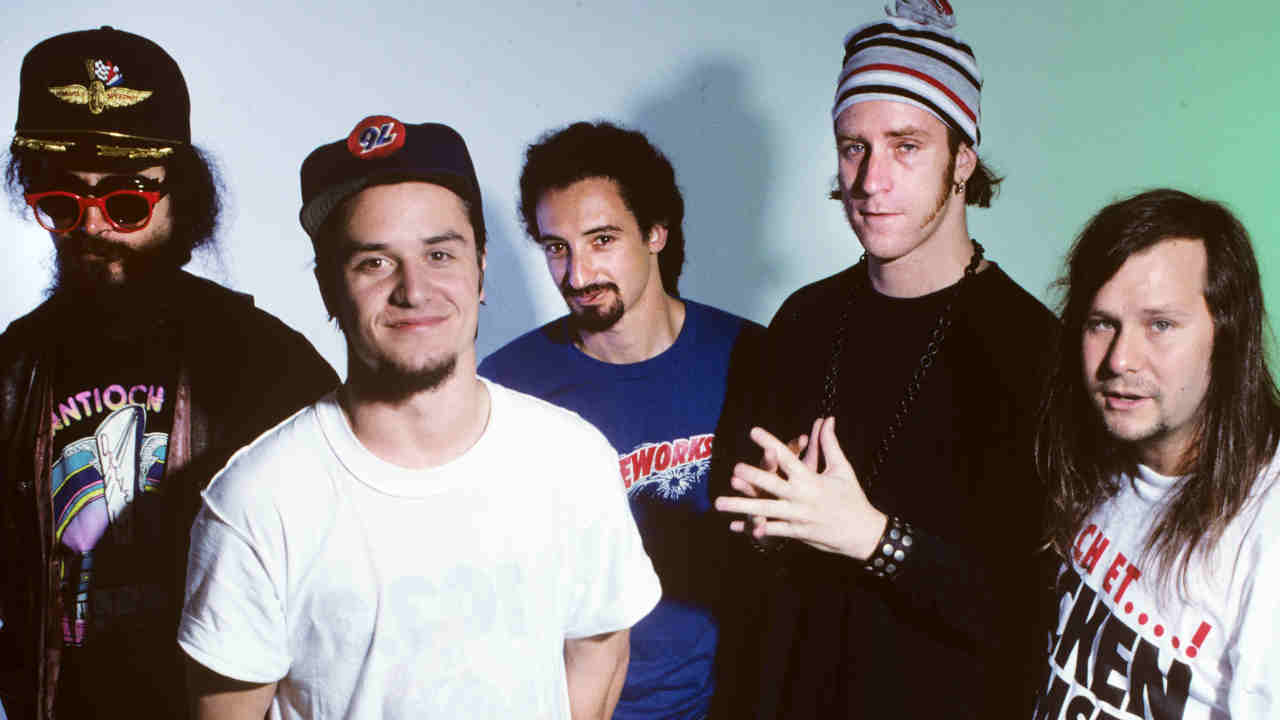Alex Skolnick: The 10 Records That Changed My Life
Testament axeman Alex Skolnick picks ten records that made him think differently

Very few guitarists can boast equally impressive credentials in both the jazz and thrash metal genres. In fact, Alex Skolnick might be a singular figure in this regard. But the legendary Testament and Metal Allegiance axeman — who also leads his own Alex Skolnick Trio — says that his musical ears needed to develop before he could fully appreciate jazz.
“At first, it was all about rock for me,” he says. “Certain records that I now love and have influenced me were just too ‘adult-sounding’ when I was younger. You know, I was like most kids – I loved Kiss and other rock bands. That’s what excited me. But at some point in my teens, jazz started to take hold, and records like Kind of Blue by Miles Davis would become very important to me. I think my ears and my sensibilities had to get a little more sophisticated for me to understand that music.”
In compiling his list of the 10 records that changed his life, Skolnick mostly looked to discs that caused him to take some sort of musical action. “Sometimes a record can do that,” he says. “You hear it and say, ‘I’m gonna do something with that.’ Of course, there are the odd records that I just enjoyed immensely and prompts good memories, but most of ones that came to mind made me do something, whether it was deciding to pick up a guitar or becoming a different type of musician. They made me think differently and steered me in a new direction.”
Soundtrack – American Hot Wax (1978)
“There’s classic rock, but this is about as classic rock as you can get. The movie was about Alan Freed and the original rock‘n’roll scene, and it stars a lot of the great ‘50s artists as themselves.
“I saw the movie in a theatre, and I got the soundtrack as a birthday present. I would listen to it endlessly. It’s how I discovered Chuck Berry, who was my favourite. In the movie he does some truly great performances. I just flipped out when I saw it. I had no idea he was so influential, that he’d influenced Hendrix and the Stones. He was the guy.
“So the record was an instant educational for me. I could relate to it along with the other music I liked – Kiss and the Beatles. And, of course, I loved Little Richard doing Tutti Frutti. That was just hilarious. My first guitar teacher showed me these songs, and suddenly I knew all about Jerry Lee Lewis and Screamin’ Jay Hawkins and all of these geat ‘50s stars. It was a real door opener to early rock‘n’roll.”
Sign up below to get the latest from Classic Rock, plus exclusive special offers, direct to your inbox!
The Beatles – Revolver (1966)
“It’s hard to pick just one Beatles record, because I love them all, even the really early stuff. But I think Revolver was the one that really signified that they were going somewhere new. They still had a bit of their early innocence, but they were pushing everything forward. For some many reasons, it’s just timeless.
“Any time somebody says they don’t like the Beatles, I have to think, ‘How is that possible?’ They did so much and changed everything. They took rock music to such a level of art, and they influenced everybody. If I come across somebody that likes Black Sabbath or Led Zeppelin but doesn’t like the Beatles, I just think it’s so bizarre. They’re my favourite band.
“There’s The White Album and Abbey Road and other great Beatles albums, but for me, at this early period in my life, Revolver solidified how important music . Actually, those later records were a little over my head at first. Revolver was the gateway that allowed me to appreciate those other albums.”
Van Halen – Van Halen (1978)
“When I heard the sound of Eddie’s guitar, just the pure sound he made, it was magical. I never knew a guitar could sound like that. It just kind of reached out and grabbed me like nothing else had before.
“I’d already been playing guitar for a few years, but hearing the first Van Halen record made me want to be a lead guitarist. Before then, I sort of hoped to be a singer-type guitar player. Now I could suddenly imagine myself on a stage playing lead guitar and doing just that. This is the album that did it for me. It wasn’t just for the sake of being a virtuoso, though, because everything Eddie did was so musical.
“In Metal Allegiance we pay tribute to some of our favourite moments, and we have a Van Halen moment in which I get to play Eruption and a couple of the tunes. At one point last year we actually did the whole Van Halen record. Wolfgang Van Halen joined us on bass on a couple of songs, and it was amazing. This record has so much depth to it. It’s a modern masterpiece.”
Kiss – Alive II (1977)
“I was pretty young at the time, and I didn’t know anybody who liked Kiss. The first live record had a cover that was sort of black and white, but Alive II was very colourful. That was the hook at first – the visual quality was a big part of the experience.
“So it had this great cover, and it was a two-record – it just seemed so big and epic. Right away, it brushed me up on a lot of the earlier Kiss songs. I didn’t know which records the songs came from, but I kind of had them all on one package.
“Back then, with vinyl albums, you could do so much with the packaging. The Rolling Stones had Sticky Fingers with the zipper on the cover. And Led Zeppelin, with Physical Graffiti, they had those windows on the building. Kiss actually had temporary tattoos that came with Alive II. As a kid, that was like opening a box of Cracker Jacks and getting a surprise. It was just a great experience.”
Soundtrack – The Rocky Horror Picture Show (1975)
“It’s amazing music. I had a friend whose older sister was a big fan of the movie and would go to midnight showings and stuff like that. I was too young for that at the time, so I missed out on that scene.
“But I heard the soundtrack and really loved it. The songs were so memorable and different. They were also very well-played and interesting compositionally. It was one of the first albums that allowed me to step into a new world, because I would listen to it with friends and without adult supervision. It was a big thing for us at summer camp, so now when I listen to it as an adult, it brings back all of those memories.
“It was also my introduction to Meat Loaf. He didn’t get too much radio play in the San Francisco Bay area. I later heard that it had something to do with him pissing off Bill Graham or something like that. The stations didn’t play Meat Loaf out of respect to Bill Graham, so I got to hear him here.”
The Jimi Hendrix Experience – Electric Ladyland (1968)
“At the time I heard it, I didn’t know there were Hendrix records before this one. I didn’t have anybody around who could educate me on that stuff. I got it partially because it was a double record – that appealed to me – and I liked All Along the Watchtower. which I’d heard on the radio. That was the hit. But some of the deep cuts were totally amazing, stuff like the original Voodoo Child. And Rainy Day, Dream Away, where he made the guitar mimic human vocal patterns, that was brilliant.
“I would read about Jimi Hendrix in Guitar Player magazine, and at the time Van Halen had sort of evolved the tone and clarity of the guitar, so Electric Ladyland didn’t sound as current to me. That didn’t take away from its brilliance, I totally understood why he had been such a big influence.
“I was very into blues guitar, too, and so I liked that Hendrix seemed to have a connection between early rock‘n’roll, like the Chuck Berry stuff, and blues. He was almost foreshadowing what was to come with Van Halen. Even though Van Halen wasn’t influenced by Hendrix, so he says, Jimi still sort of set the pace of where the guitar was going to go.”
Pat Metheny, Dave Holland and Roy Haynes – Question and Answer (1990)
“I was aware of Pat Metheny and I knew he was a great guitar player, but much of the stuff he did with the Pat Metheny Group was very sophisticated and felt a little too adult for me. Somehow, I heard Question and Answer over a PA system at a jazz concert – I forget who was playing – and I actually went to the sound man and asked him what it was. ‘Yeah, this is the new album by Pat Metheny,’ he said. And I told him, ‘I didn’t know he played like that.’
“It’s a guitar trio, but it just has this magic and rawness. It doesn’t have the processing that some of the Pat Metheny Group albums had; there was more of a frenetic energy to it, as well as some really interesting music. It’s just pleasant to put on, the mood it puts you in. I love it when a record can do that to you.
“It not only opened me up to Pat Metheny, who’d become one of my biggest guitar influences later in my post-Van Halen period, but it kind of inspired me to take action. My main instrumental project is a guitar trio with upright bass and drums. I think the seeds for doing that were planted by listening to this record.”
Ozzy Osbourne – Diary of a Madman (1981)
“I discovered Randy Rhoads by listening to this record. He was sort of an associate of Van Halen – same time period, both from the Los Angeles music scene, both modern guitar players. He was doing something very different, though, with his classical influences and a kind of Gothic quality he had in his playing.
“That was the I direction I was going in when I first started writing ideas for Testament, that period of Ozzy and Rainbow and other modern heavy music that had a dark sort of classical quality. I wanted to write things that could have fit on Diary of a Madman, but sped up radically.
“When I was in the eighth grade, a friend played me this record. It was one of those moments – ‘You’re a guitarist. You have to hear this.’ I was really struck by the title track. Randy did this incredible acoustic introduction that I later found out was inspired by a Cuban classical guitarist named Leo Brouwer. Within months of my first hearing it, there was someone on the playground going, ‘Did you hear what happened to Ozzy Osbourne’s guitarist?’ I couldn’t believe it. It was right after I discovered Randy.”
“Years later, I got to play one gig with Ozzy. He was between guitar players, so I got the chance to step into Randy’s shoes for a night. It was an amazing experience.”
Al Di Meola – Elegant Gypsy (1977)
“He was my gateway to jazz. Even though his actual playing isn’t necessarily jazz harmonically, the process was very jazzy because he would have the improvisation. Some of the musicians he would interact with were real in a jazz sense – they’re phrasing was very different.
“I became a big Al DiMeola fan because of this record, but I also discovered Chick Corea, too. Oh, and Paco de Lucia, the great flamenco guitarist, he’s on here. Before that I hadn’t been aware of these types of artists. Suddenly it was like, ‘Wow, who are all of these people?’
“It’s great music to listen to. The title is perfect because it is elegant, even though it’s very intense and some of the guitar playing is just frightening. It definitely changed my guitar technique. It opened me up to a whole new range of possibilities.”
Miles Davis – Kind of Blue (1959)
“Kind of Blue is just a timeless record. It influenced so many artists in its time, and not just jazz artists. It really kind of changed the world.
“I think it was the first straight-ahead jazz album that I liked. I didn’t know I could like an album with piano and trumpets. Coming from the rock state of mind as a pre-teen, music like this wasn’t something I thought I could relate to. But by my late teens, it was just the perfect balance to the heavy music I was doing at the time.
“By 18, I was already touring and I had already sort of had a foot in the music world doing this very intense rocking music. Kind of Blue was the opposite of all that. It’s got this delicate quality – it’s ambient and delicate. It became one of my favourite albums to listen to because it always seemed to change my mood for the better.”
Joe is a freelance journalist who has, over the past few decades, interviewed hundreds of guitarists for Guitar World, Guitar Player, MusicRadar and Classic Rock. He is also a former editor of Guitar World, contributing writer for Guitar Aficionado and VP of A&R for Island Records. He’s an enthusiastic guitarist, but he’s nowhere near the likes of the people he interviews. Surprisingly, his skills are more suited to the drums. If you need a drummer for your Beatles tribute band, look him up.

